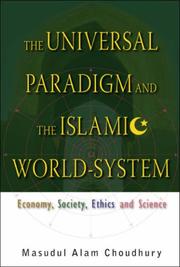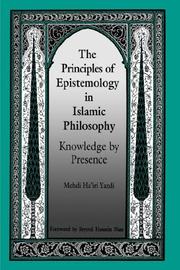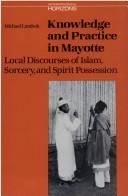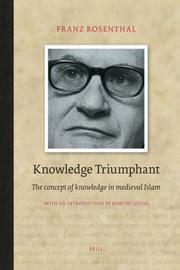| Listing 1 - 9 of 9 |
Sort by
|
Book
ISBN: 9004191062 9789004191068 9789004186620 900418662X Year: 2011 Publisher: Leiden Boston Brill
Abstract | Keywords | Export | Availability | Bookmark
 Loading...
Loading...Choose an application
- Reference Manager
- EndNote
- RefWorks (Direct export to RefWorks)
This book analyzes the concept of ḥikmah in early Islamic texts within a network of multiple conceptual interrelationships in the cross-disciplinary context of Muslim works, roughly up to al-Ghazali's lifetime. The word ḥikmah has a wide spectrum of connotations in these texts, because it basically contains all knowledge within human reach, and accordingly, received a range of diverse scholarly treatments. This work contextualizes ḥikmah in a nuanced fashion in the collective usage of early Muslim authors, mainly by lexicographers, exegetes, philosophers, and Sufis. For the first time in the field of Arabic and Islamic Studies, particularly in Islamic Philosophy and Sufism, this study explores the concept of ḥikmah in an all-embracing capacity. Ḥikmah is a central concept of Islamic thinking, related to almost all intellectual disciplines of Muslim scholarly tradition, but it has been insufficiently underlined and treated in earlier western scholarship.
Islam --- Islamic philosophy --- Knowledge, Theory of (Islam) --- Islamic epistemology --- Doctrines --- History.

ISBN: 1134959818 1280216905 9786610216901 0203980204 9780203980200 0415035945 0415035953 9780415035941 9780700710645 9781134959815 9781280216909 6610216908 9781134959761 9781134959808 113495980X Year: 1992 Publisher: London ; New York : Routledge,
Abstract | Keywords | Export | Availability | Bookmark
 Loading...
Loading...Choose an application
- Reference Manager
- EndNote
- RefWorks (Direct export to RefWorks)
Examines one of the most exciting and dynamic periods in the development of medieval Islam, from the late 9th to the early 11th century, through the thought of five of its principal thinkers, prime among them al-Farabi. This great Islamic philosopher, called 'the Second Master' after Aristotle, produced a recognizable school of thought in which others pursued and developed some of his own intellectual preoccupations. Their thought is treated with particular reference to the most basic questions which can be asked in the theory of knowledge or epistemology. The book thus fills a lacuna in the l
Knowledge, Theory of (Islam) --- Islamic epistemology --- Islamic philosophy --- Fārāb --- Contributions in theory of knowledge. --- Farabi

ISBN: 9789812704603 9812704604 9786611938451 1281938459 9812790837 9789812790835 9781281938459 6611938451 Year: 2007 Publisher: Hackensack, NJ World Scientific
Abstract | Keywords | Export | Availability | Bookmark
 Loading...
Loading...Choose an application
- Reference Manager
- EndNote
- RefWorks (Direct export to RefWorks)
"Written by a contemporary pioneer in the area of the universal paradigm and Islamic world-systems, this book offers a fresh post-modernist outlook on new epistemological investigations in the universal paradigm. It addresses the problems of the unity of knowledge in learning systems, thereby invoking the foundations of Islamic epistemology. The author presents a phenomenological model of unity of knowledge in economics, ethics, science and society. Some critical areas where this model can be applied are also explored. As a foundational study on Islamic theory of knowledge covering the fields of Islamic economics, finance, science and society, the book will be valuable to researchers, practitioners and global academic institutions."
Economics --- Islam and science. --- Knowledge, Theory of (Islam). --- Religious aspects --- Islam. --- Knowledge, Theory of (Islam) --- Islamic epistemology --- Science and Islam --- Islam and economics --- Islamic philosophy --- Science

ISBN: 0585064059 9780585064055 0791409473 0791409481 9780791409473 9780791409480 1438424574 Year: 1992 Publisher: Albany State university of New York press
Abstract | Keywords | Export | Availability | Bookmark
 Loading...
Loading...Choose an application
- Reference Manager
- EndNote
- RefWorks (Direct export to RefWorks)
Knowledge, Theory of (Islam) --- Knowledge, Theory of. --- Knowledge, Theory of --- Philosophy --- Philosophy & Religion --- Epistemology --- Theory of knowledge --- Psychology --- Islamic epistemology --- Islamic philosophy

ISBN: 1281997277 9786611997274 1442676531 9781442676534 9781281997272 0802029604 9780802029607 0802077838 9780802077837 1442638613 Year: 1993 Publisher: Toronto
Abstract | Keywords | Export | Availability | Bookmark
 Loading...
Loading...Choose an application
- Reference Manager
- EndNote
- RefWorks (Direct export to RefWorks)
In a witty, evocative style accessible to both the specialist and non-specialist reader, Michael Lambek provides a significant contribution to writing on African systems of thought, local forms of religious and therapeutic practice, social accountability, and the place of explicit forms of knowledge in the analysis of non-western societies.
Islam --- Spirit possession --- Knowledge, Theory of (Islam) --- Mohammedanism --- Muhammadanism --- Muslimism --- Mussulmanism --- Religions --- Muslims --- Islamic epistemology --- Islamic philosophy --- Possession, Spirit --- Experience (Religion) --- Mayotte --- Social life and customs. --- Mayotta Island --- Maote --- Ile Mayotte --- Mayotta --- Collectivité territoriale de Mayotte

ISBN: 9004153861 9789004153868 9786611400576 1281400572 9047410955 9789047410959 9781281400574 6611400575 Year: 2007 Volume: 2 Publisher: Boston Leiden Brill
Abstract | Keywords | Export | Availability | Bookmark
 Loading...
Loading...Choose an application
- Reference Manager
- EndNote
- RefWorks (Direct export to RefWorks)
In Knowledge Triumphant , Franz Rosenthal observes that the Islamic civilization is one that is essentially characterized by knowledge ( 'ilm ), for 'ilm is one of those concepts that have dominated Islam and given Muslim civilization its distinctive shape and complexion.' There is no branch of Muslim intellectual and daily life that remained untouched by the all-pervasive attitude towards 'knowledge' as something of supreme value for Muslim being. With a new foreword by Dimitri Gutas.
Knowledge, Theory of (Islam) --- Learning and scholarship --- Islamic learning and scholarship. --- Muslim learning and scholarship --- Muslims --- Medieval learning and scholarship --- Education, Medieval --- Islamic epistemology --- Islamic philosophy --- History --- Intellectual life --- Connaissance, Théorie de la --- Savoir et érudition --- Philosophie islamique --- Philosophie arabe --- Islam --- Pays islamiques --- Histoire --- 622-1258 --- Moyen-Age

ISBN: 0802077838 0802029604 Year: 1993 Publisher: Toronto : University of Toronto Press,
Abstract | Keywords | Export | Availability | Bookmark
 Loading...
Loading...Choose an application
- Reference Manager
- EndNote
- RefWorks (Direct export to RefWorks)
Islam --- Knowledge, Theory of (Islam). --- Spirit possession --- #SBIB:39A73 --- #SBIB:39A10 --- Etnografie: Afrika --- Antropologie: religie, riten, magie, hekserij --- Possession par les esprits --- Mayotte --- Social life and customs --- Moeurs et coutumes --- Knowledge, Theory of (Islam) --- Possession, Spirit --- Experience (Religion) --- Islamic epistemology --- Islamic philosophy --- Mohammedanism --- Muhammadanism --- Muslimism --- Mussulmanism --- Religions --- Muslims --- Mayotta Island --- Maote --- Ile Mayotte --- Mayotta --- Collectivité territoriale de Mayotte --- Social life and customs.
Book
ISBN: 9789004378353 9004378359 9004381112 Year: 2018 Publisher: Leiden ; Boston : Brill,
Abstract | Keywords | Export | Availability | Bookmark
 Loading...
Loading...Choose an application
- Reference Manager
- EndNote
- RefWorks (Direct export to RefWorks)
In Beyond Schools: Muḥammad b. Ibrāhīm al-Wazīr's (d. 840/1436) Epistemology of Ambiguity, Damaris Wilmers provides the first extensive analysis of Ibn al-Wazīr's thought and its role in the "Sunnisation of the Zaydiyya", emphasizing its significance for conflicts between schools of thought and law beyond the Yemeni context. Contrasting Ibn al-Wazīr's works with those of his Zaydi contemporary Aḥmad b. Yaḥyā b. al-Murtaḍā, Damaris Wilmers offers a study of a number of heretofore unedited texts from 9th/15th century Yemen when Zaydi identity was challenged by an increasing theological and legal diversity. She shows how Ibn al-Wazīr, who has been classed with different schools, actually de-emphasized school affiliation and developed an integrative approach based on a unique theory of knowledge.
Knowledge, Theory of (Islam) --- God (Islam) --- Ijtihād (Islamic law) --- Islamic law --- Qiyās (Islamic law) --- Allah --- Monotheism (Islam) --- Islam --- Islamic epistemology --- Islamic philosophy --- Ibn al-Wazīr, Muḥammad ibn Ibrāhīm, --- Ibn al-Murtaḍá, Aḥmad ibn Yaḥyá, --- Aḥmad ibn Yaḥyá ibn al-Murtaḍá, --- Aḥmad ibn Yaḥyá al-Murtaḍá, --- Murtaḍá, Aḥmad ibn Yaḥyá, --- احمد بن يحيى بن المرتضى، --- احمد بن يحيى المرتضى، --- مرتضى، احمد بن يحيى، --- إبن المرتض، أحمد بن يحي، --- إبن المرتضى، أحمد إبن يحيى، --- إبن المرتضى، أحمد بن يحي، --- ابن المرتضى، أحمد بن يحي --- ابن المرتضى، أحمد بن يحيى --- ابن المرتضى، أحمد بن يحيى، --- بن المرتضى، أحمد بن يحيى، --- زبيدي، أحمد بن يحيى، --- الزبيدي، أحمد بن يحيى، --- مهدي لدين الله، --- المهدي لدين الله، --- مهدي، أحمد بن يحيى، --- المهدي، أحمد بن يحيى، --- Zubaydī, Aḥmad ibn Yaḥyá, --- Mahdī li-Dīn Allāh, --- Mahdī, Aḥmad ibn Yaḥyá, --- Muḥammad ibn Ibrāhīm ibn al-Wazīr, --- Muḥammad ibn Ibrāhīm ibn al-Wazīr al-Ṣanʻānī, --- Ṣanʻānī, Muḥammad ibn Ibrāhīm ibn al-Wazīr, --- ابن الوزير، محمد بن إبراهيم، --- ابن الوزير، محمد بن ابراهيم --- محمد بن إبراهيم الوزير اليمني
Book
ISBN: 9780195478341 0195478347 Year: 2010 Publisher: Karachi Oxford University Press
Abstract | Keywords | Export | Availability | Bookmark
 Loading...
Loading...Choose an application
- Reference Manager
- EndNote
- RefWorks (Direct export to RefWorks)
Muslim scholars --- Knowledge, Theory of (Islam) --- 297.1 --- 297.17 --- Islamic epistemology --- Islamic philosophy --- History of doctrines. --- Islam:--religieuze vraagstukken : indelen zoals 291.1/.8 --- Islam: religieus geïnspireerde acties; fanatisme --- Ibn Taymiyah, Ahmad ibn Abd al-Halim, --- Ibn Taymīyah, Aḥmad ibn ʻAbd al-Ḥalīm, --- 297.17 Islam: religieus geïnspireerde acties; fanatisme --- 297.1 Islam:--religieuze vraagstukken : indelen zoals 291.1/.8 --- History of doctrines --- Ibn Taymīyah, Aḥmad ibn ʻAbd al-Ḥalīm, --- Aḥmad ibn ʻAbd al-Ḥalīm ibn Taymīyah, --- Ḥarrānī, Aḥmad ibn ʻAbd al-Ḥalīm, --- Ibn Taymīyah, Taqī al-Dīn, --- Taqijuddin Ibnu Taimyah, --- Aḥmad ibn ʻAbd al-Ḥalīm al-Ḥarrānī, --- Taqī al-Dīn ibn Taymīyah, --- Ibnu Taimiyah, Taqijuddin, --- Ibn Taymīyah, --- Taqi al-Din Ahmad ibn Taymiyya, --- Ibn Taymiyya, Taqi al-Din Ahmad, --- Ibn Taymiyya, --- Ibn Taimiyyah, --- Ibn Taymiyyah, --- Ibn Taimiyah, --- Ibn-i Taimīyah, --- Ibn-e-Taimiya, --- Ibne Taimiyah, --- أبن تيميه، أحمد بن عبدالحليم --- أبي العباس تقي الدين أحمد بن عبد الحايم ابن تيمية الحراني --- أحمد بن تيمية --- أحمد بن عبد الحليم --- أحمد بن عبد الحليم ابن تيمية، --- أحمد بن عبد الحليم بن تيمية --- إبن تيمية، احمد بن عبد الحليم --- إبن تيمية، احمد عبد الحليم --- إبن تيميه، أحمد بن عبد الحليم --- ابن تمية، أحمد بن عبد الحليم --- ابن تيمية، أحمد --- ابن تيمية، أحمد ابن عبد الحليم، --- ابن تيمية، أحمد بن عبد الحليم بن عبد السلام --- ابن تيمية، أحمد بن عبد الحليم، --- ابن تيمية، أحمد عبد الحليم، --- ابن تيمية، احمد ابن عبدالحليم، --- ابن تيمية، احمد بن عبد الحليم، --- ابن تيمية، محمد بن عبد الحليم --- ابن تيميه، أحمد بن عبد الحليم، --- ابن تيميه، احمدابن عبدالحليم --- بن تيمية، أحمد ابن عبد الحليم، --- بن تيمية، أحمد بن الحليم، --- بن تيمية، أحمد بن عبد الحليم، --- بن تيمية، احمد بن عبد الحليم، --- تقي الدين أبي العباس أحمد بن تيمية --- تقي الدين أحمد بن تيمية --- تقي الدين أحمد بن عبد الحليم بن تيمية --- تقي الدين ابو العباس احمد بن عبد الحليم بن تيمية --- Ibn-i Taimiyah al-Ḥarānī, Aḥmad bin ʻAbdulḥalīm, --- ابن تيميه الحرانى، احمد بن عبد الحليم، --- ابن تيميه، --- ابن تيميه الحرانى، احمد بن عبد الحليم، --- ابن تيميه، --- Ibn Taymiyyaẗ, Aḥmad ibn ʿAbd al-Ḥalīm Taqī al-Dīn (1263-1328) f --- Savants musulmans --- Théorie de la connaissance (islam) --- Empire islamique --- Biographies --- Histoire des doctrines
| Listing 1 - 9 of 9 |
Sort by
|

 Search
Search Feedback
Feedback About UniCat
About UniCat  Help
Help News
News